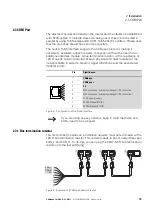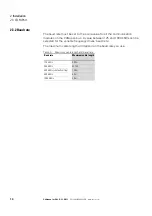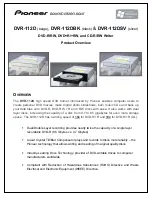
I
Before commencing the installation
• Disconnect the power supply of the device.
• Ensure that devices cannot be accidentally restarted.
• Verify isolation from the supply.
• Earth and short circuit the device.
• Cover or enclose any adjacent live components.
• Follow the engineering instructions (AWA/IL) for the
device concerned.
• Only suitably qualified personnel in accordance with
EN 50110-1/-2 (VDE 0105 Part 100) may work on this
device/system.
• Before installation and before touching the device ensure
that you are free of electrostatic charge.
• The functional earth (FE, PES) must be connected to the
protective earth (PE) or the potential equalisation. The
system installer is responsible for implementing this
connection.
• Connecting cables and signal lines should be installed so
that inductive or capacitive interference does not impair
the automation functions.
• Install automation devices and related operating elements
in such a way that they are well protected against
unintentional operation.
• Suitable safety hardware and software measures should
be implemented for the I/O interface so that an open
circuit on the signal side does not result in undefined
states in the automation devices.
• Ensure a reliable electrical isolation of the extra-low
voltage of the 24 V supply. Only use power supply units
complying with IEC 60364-4-41 (VDE 0100 Part 410) or
HD384.4.41 S2.
• Deviations of the mains voltage from the rated value must
not exceed the tolerance limits given in the specifications,
otherwise this may cause malfunction and dangerous
operation.
• Emergency stop devices complying with IEC/EN 60204-1
must be effective in all operating modes of the automation
devices. Unlatching the emergency-stop devices must not
cause a restart.
• Devices that are designed for mounting in housings or
control cabinets must only be operated and controlled
after they have been installed and with the housing
closed. Desktop or portable units must only be operated
and controlled in enclosed housings.
• Measures should be taken to ensure the proper restart of
programs interrupted after a voltage dip or failure. This
should not cause dangerous operating states even for a
short time. If necessary, emergency-stop devices should
be implemented.
• Wherever faults in the automation system may cause
injury or material damage, external measures must be
implemented to ensure a safe operating state in the event
of a fault or malfunction (for example, by means of
separate limit switches, mechanical interlocks etc.).
• Depending on their degree of protection, frequency
inverters may contain live bright metal parts, moving or
rotating components or hot surfaces during and
immediately after operation.
• Removal of the required covers, improper installation or
incorrect operation of motor or frequency inverter may
cause the failure of the device and may lead to serious
injury or damage.
• The applicable national accident prevention and safety
regulations apply to all work carried on live frequency
inverters.
• The electrical installation must be carried out in
accordance with the relevant regulations (e. g. with
regard to cable cross sections, fuses, PE).
• Transport, installation, commissioning and maintenance
work must be carried out only by qualified personnel
(IEC 60364, HD 384 and national occupational safety
regulations).
• Installations containing frequency inverters must be
provided with additional monitoring and protective
devices in accordance with the applicable safety
regulations. Modifications to the frequency inverters
using the operating software are permitted.
• All covers and doors must be kept closed during
operation.
• To reduce the hazards for people or equipment, the user
must include in the machine design measures that restrict
the consequences of a malfunction or failure of the drive
(increased motor speed or sudden standstill of motor).
These measures include:
– Other independent devices for monitoring safety-
related variables (speed, travel, end positions etc.).
– Electrical or non-electrical system-wide measures
(electrical or mechanical interlocks).
– Never touch live parts or cable connections of the
frequency inverter after it has been disconnected from
the power supply. Due to the charge in the capacitors,
these parts may still be live after disconnection. Fit
appropriate warning signs.
Eaton Industries
G
mbH
Safety instructions
Danger!
Dangerous electrical voltage!
Summary of Contents for PowerXL DA1
Page 4: ...II ...




































